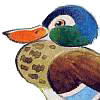
It took me all of week 3 to finish The Friendship Factor.
#7: Read a book with more pages than the previous book.
There were plenty of options here, as The Friendship Factor is a pretty slim volume, but I opted to count The Martian, which I was re-reading for a book club. This is the third time I've read it (not to mention having seen the movie version), and it's not quite as compelling when I know all the plot twists already, but it was still a fun time.
#8: If the previous book had a person on the cover, read a book without a person on the cover.
This is proving to be something of a problem, as all the books I had lined up to read for other reading challenges have people on the cover, and so do a significant proportion of the books on my TBR in general.
Attempt #1 was Gorky Park by Martin Cruz Smith. The opening chapters introduce a large cast of quirky characters who I didn't care a jot about, and a gruesome murder which I also didn't care about, partly because none of the characters seemed to care about it either: even the detective protagonist was just going through the motions while he looked for an excuse to shove the case off on somebody else, while also having a boring marriage crisis that I suspect was going to lead to him having a fling with a material witness or something. I gave it fifty pages to hook me and then abandoned it without regret. On the bright side, I got two books off the TBR for the price of one, since I got rid of the sequel as well.
While I was taking the sequel off the bookshelf, my eye was caught by the neighbouring book, The Tin Dog by Alexander McCall Smith, which I decided to read as a palate cleanser. It was okay, but I'm well out of the target age range and I kept wanting to ask spoilsport logistical questions like "How sentient is this robot dog supposed to be, actually?" and "Can you really enter a dog in a greyhound race on the morning of the race?" (not to mention "Isn't entering your robot dog in a race with ordinary dogs, you know, cheating?"). I went back and forth on whether to count it as an official attempt for the Book Chain - the cover image doesn't feature a person, but there are people present in the background - and decided against as much as anything else because of how slight it is.
Around the same time, I finished reading The Tolkien and Middle-Earth Handbook, which has a landscape on the cover with no people that I could see, but is disqualified because I've been reading it on and off since before I started the chain.
Official attempt #2 was Major Pettigrew's Last Stand by Helen Simonson, which I read fifty pages of and then... not abandoned, exactly, I have a feeling I might get back to it at some point when I'm in the right mood, but I'm certainly not in the right mood for it now. I remember saying when I read Remarkably Bright Creatures that if it weren't for the octopus it would be a kind of book I don't usually read; Major Pettigrew's Last Stand is that kind of book with no octopi in sight, nor the kind of spark that made me continue to be interested in the human characters of Remarkably Bright Creatures even when the octopus wasn't around. The main characters seem like sensible people, and I don't appear to be in any suspense about whether they're going to sort their problems out in the end, and in the mean time I'm not really in the frame of mind to enjoy watching people being smothered by social convention and being forced to confront their mortality.
After going through my TBR shelves and not finding anything that called out to me (at least, not that didn't have a person on the cover), I resorted to going to the local public library and wandering the stacks until I settled on Agatha Christie's The Mysterious Affair at Styles, in an edition which has the eponymous manor house on the cover with no people. From past experience with Christie, I'm reasonably confident I'll find it at least readable enough to get through it without giving up and that even if there's a few deaths there will be a minimum of people confronting their own mortality.